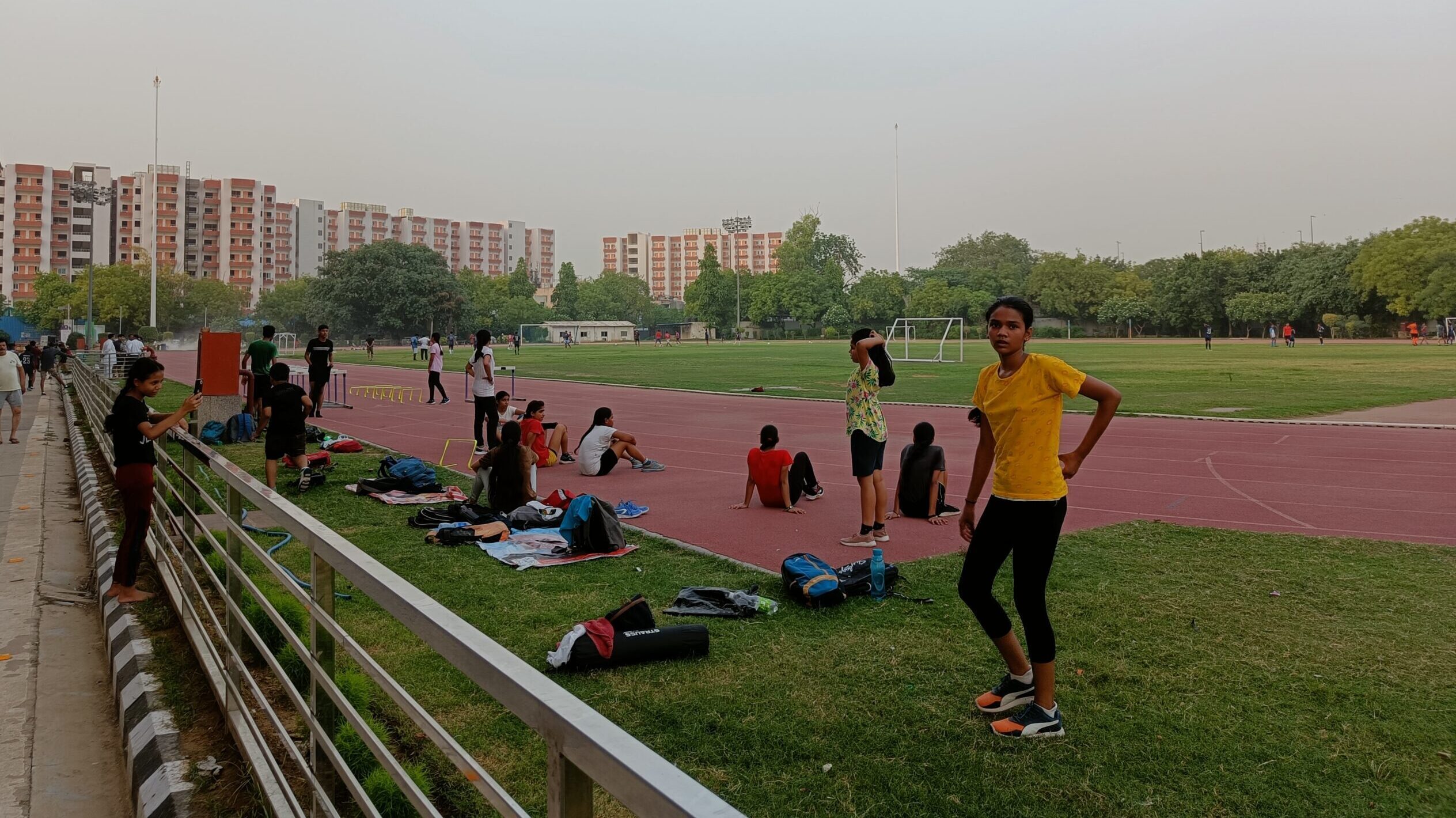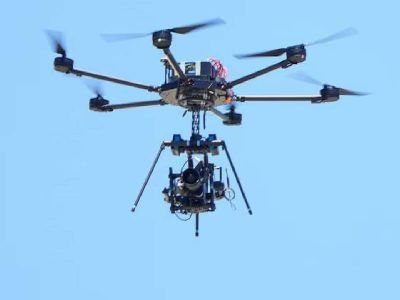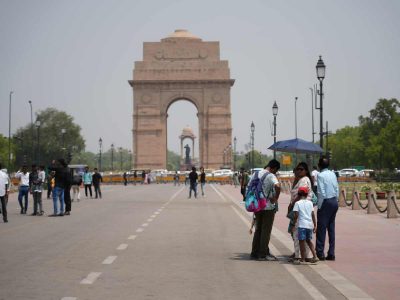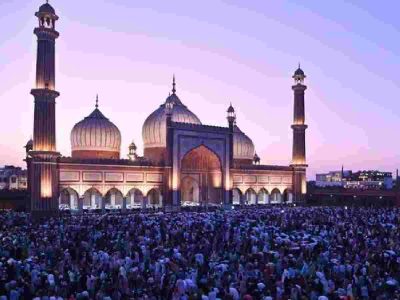At 5:30 pm, Delhi’s Thyagraj Stadium, which wembroiled in controversy over a pet dog a week back, was full of junior athletes playing various games. The stadium was catering for athletics, football and basketball players. The fully air-conditioned indoor stadium was bustling with the sound of badminton shots.
On 26 May, Indian Express had reported how athletes and coaches in the stadium were asked to leave early before 7 pm so that Delhi’s former principal secretary (Revenue) Sanjeev Khirwar and his wife, also an IAS officer, could walk his dog in the stadium.
After the story broke, social media was abuzz with chatter on this issue. When this matter came under the notice of the Delhi government, Deputy Chief Minister and Education Minister Manish Sisodia took action to give respite to athletes and coaches.
In a Twitter post, he informed that all Delhi sports facilities will stay open for sportsmen till 10 pm.
“News reports have brought to our notice that certain sports facilities are being closed early causing inconvenience to sportsmen who wish to play till late nite. CM@ArvindKejriwal has directed that all Delhi Govt sports facilities stay open for sportsmen till 10 pm,” wrote Sisodia.
Patriot spent an evening at the stadium to find out how things have changed after the timings were extended.
Around 5 pm, junior athletes started arriving for practice. Half an hour later, kids in colourful jerseys could be seen warming up to start their games.
However, it’s not as if the running of the stadium is now beyond reproach. The coaches are not happy with the extended working hours. While talking with the Patriot, one of the coaches explained that most of the students who come in the evening are school children and many of them leave around 7-8 pm but, after the time change, coaches have to stay until 10 pm.
“In the evening mostly, athletes are kids and most of them are girls. They leave early because the neighbouring area is not safe. After they leave, the stadium is empty and we have nothing to do” says one of the coaches.

When asked why the timings have been changed, he resisted talking about the IAS controversy and answered, “Timings have been changed because of the heat. Before the change in time, we usually start practising early but the sun used to be directly on our heads. But now as timings has changed, we start a bit late,” says the coach
But he further explained the other side of the problem. “Extended timings have given more time to play but many athletes leave early because they come from far away,” adds the coach.
Priya, a resident of Okhla and student of Class 9, comes to the stadium to play badminton but she leaves around 6 pm. “Usually, my father comes to pick me up but sometimes he is not able to come. At such times, I go with my friend’s father. But I prefer to leave early,” says Priya.
Priya is not alone. Shweta, who comes to the stadium to practice football, also prefers to leave early. The fear that female athletes experience also raises question marks over the law and order situation in the city. All the state government’s efforts to make the city safe at night seem like empty promises.
By 8:30 pm, there was little activity in the stadium. Only coaches were seen killing time on the track.
Coaches said on condition of anonymity, “We are answerable to parents; they start calling us if someone gets late and, in the end, if a mishap takes place, we are answerable”.
After Thyagaraj Stadium made headlines, the central government also swung into action. On the evening of 26 May, Delhi’s Principal Secretary (Revenue) Sanjeev Khirwar and his wife Rinku Dugga, the two IAS officers, were transferred out of Delhi to Ladakh and Arunachal Pradesh, respectively.
When media contacted the 1994-batch IAS officer, he accepted that he “sometimes” took his pet for a walk at the facility but denied that it disrupted the practice routine of athletes.
Various people lauded the central government’s step and the dog became the focus of discussion. People were seen trolling the couple and were discussing which posting the dog will opt for.
After 7 pm, only students who were practising for the Shaheed Bhagat Singh Cup were left in the stadium. They also left around 8:15 pm. One of the coaches explained, “They are not permanent players of this stadium. They are here for a month-long camp. Those who practice daily have left.”
When we asked the security guard about the controversy and whether he knows the officer, he said, “Sir was a nice person and his wife used to come with him once in two-three months.” He then clammed up.
When we asked how things have changed for him, he said, “Earlier, the stadium used to close at 7 pm but our duty used to be till 10 pm; nothing has changed for me”.
The guard belongs to Uttar Pradesh and has been living in the capital for the last two decades. The private contractor pays him 15,000 a month to guard the stadium but he says this is not enough. He also works at other place as a guard to earn enough for the family of four people. “As inflation is increasing, it is becoming hard for me to run the family. I work 16 hours a day in two shifts at two places to make ends meet.”
Another guard complains of boredom in the evening hours. “The kids leave at 6-7 pm and the stadium empties. If there are kids, it’s easy for us to pass time but when it’s empty the hours drag till our shift ends,”
The more serious problem seems to be the unusually long working hours. Even though they now have to stay on till 10 pm, in the morning they have to report for duty at 6 am. “Earlier we used to leave at 7:30 pm but now we are asked to stay here till 10 pm. My commute takes one and half hours one way. Now I reach home around 11 pm”.
“Who will we coach if there is no one to play?” adds the coach. “We sit idle for hours or we walk on tracks to kill time. There are some women coaches who reach their homes in the dark night. They have kids and husbands to feed at home but now extended duty has increased their burden.”
Talking to junior athletes reveals a more upbeat mood. Akanksh, who plays basketball and is a resident of Jasola Vihar, has been playing in the stadium for the last four years. When asked what has changed after the controversy erupted, he said: “Earlier, when IAS officers used to come, we were asked to halt our practice so that the stadium could be emptied but now we have enough time to cool down”.
His coaching starts at 5 pm and ends at 7 pm but earlier he and his teammates were asked to leave the game in between at 6:50 pm. They had no time to cool down or change their clothes.
“Earlier we were limited to 7 pm but now have time to practice more. We are talking with our coach to extend the training time so that we can focus more on our game,” says the basketball player.
Earlier, various games used to be played simultaneously on the same ground. Now they are thinking of dividing the time into shifts, so that each game can be played properly.
Other athletes further defined the problems players face. Sometimes, the stadium is rented for private functions to generate revenue and they feel dismayed when they reach the stadium and see their playing field is already leased for another purpose.
While talking with Patriot, another athlete who preferred anonymity said, “Thyagaraj Stadium, in particular, is difficult to access for most athletes. They come from up to 50 km from the outskirts of the city to train due to their pure love and passion for the sport but many a time when they reach the stadium, they find that their training spaces are not available or leased out for private functions and revenue-generating opportunities,” says Preet.
He understands the math: a single athlete pays Rs 300 a month but event organisers pay lakhs of rupees a day. However, a stadium cannot be seen as a generator of income. The training of our budding sportspersons should not be interrupted for the sake of revenue.
It seems there are many other problems dogging stadia in the national capital than just a dog enjoyed its vast expanse.
For more stories that cover the ongoings of Delhi NCR, follow us on:
Instagram: https://www.instagram.com/thepatriot_in/
Twitter: https://twitter.com/Patriot_Delhi
Facebook: https://www.facebook.com/Thepatriotnewsindia





